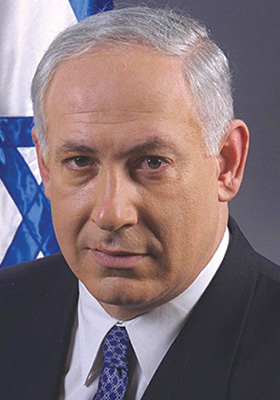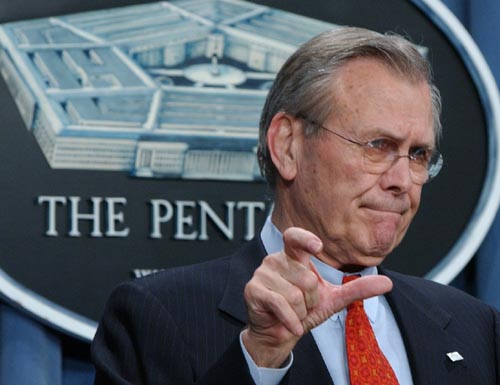Posted on Sunday 14 June 2009
America’s coercive interrogation methods were reverse-engineered by two C.I.A. psychologists who had spent their careers training U.S. soldiers to endure Communist-style torture techniques. The spread of these tactics was fueled by a myth about a critical "black site" operation.by Katherine Eban
Vanity FairJuly 17, 2007
 This article should be read in its entirety. It’s one I hadn’t seen. I was traveling in Eastern Europe when it came out, but I’m surprised I didn’t run across it along the way. It’s about two Psychologists [James Mitchell and Bruce Jessen] who went to work for the C.I.A. and devised the torture techniques used on Abu Zubaydah in 2002. They are the contractors who replaced the F.B.I.’s Ali Soufon in Abu Zubaydah’s interrogation. Senator Sheldon Whitehouse recently made a speech on the Senate floor and then appeared on the Rachel Maddow show talking about the interrogations, particularly of Zubaydah. He’s seen all the documentation as a member of the Senate Select Committee on Intelligence that is investigating the Torture Policy. He says:
This article should be read in its entirety. It’s one I hadn’t seen. I was traveling in Eastern Europe when it came out, but I’m surprised I didn’t run across it along the way. It’s about two Psychologists [James Mitchell and Bruce Jessen] who went to work for the C.I.A. and devised the torture techniques used on Abu Zubaydah in 2002. They are the contractors who replaced the F.B.I.’s Ali Soufon in Abu Zubaydah’s interrogation. Senator Sheldon Whitehouse recently made a speech on the Senate floor and then appeared on the Rachel Maddow show talking about the interrogations, particularly of Zubaydah. He’s seen all the documentation as a member of the Senate Select Committee on Intelligence that is investigating the Torture Policy. He says:I want my colleagues and the American public to know that, measured against the information I’ve been able to gain access to, the story-line that we have been led to believe, the story-line about waterboarding that we have been sold, is false in every one of its dimensions, and I ask that my colleagues be patient and be prepared to listen to the evidence when all is said and done before they wrap themselves in that story-line.
After a 10-month investigation comprising more than 70 interviews as well as a detailed review of public and confidential documents, I pieced together the account of the Abu Zubaydah interrogation that appears in this article. I also discovered that psychologists weren’t merely complicit in America’s aggressive new interrogation regime. Psychologists, working in secrecy, had actually designed the tactics and trained interrogators in them while on contract to the C.I.A.
Two psychologists in particular played a central role: James Elmer Mitchell, who was attached to the C.I.A. team that eventually arrived in Thailand, and his colleague Bruce Jessen… Both worked in a classified military training program known as sere—for Survival, Evasion, Resistance, Escape—which trains soldiers to endure captivity in enemy hands. Mitchell and Jessen reverse-engineered the tactics inflicted on sere trainees for use on detainees in the global war on terror, according to psychologists and others with direct knowledge of their activities. The C.I.A. put them in charge of training interrogators in the brutal techniques, including "waterboarding," at its network of "black sites." In a statement, Mitchell and Jessen said, "We are proud of the work we have done for our country."
The agency had famously little experience in conducting interrogations or in eliciting "ticking time bomb" information from detainees. Yet, remarkably, it turned to Mitchell and Jessen, who were equally inexperienced and had no proof of their tactics’ effectiveness, say several of their former colleagues. Steve Kleinman, an Air Force Reserve colonel and expert in human-intelligence operations, says he finds it astonishing that the C.I.A. "chose two clinical psychologists who had no intelligence background whatsoever, who had never conducted an interrogation … to do something that had never been proven in the real world."
The tactics were a "voodoo science," says Michael Rolince, former section chief of the F.B.I.’s International Terrorism Operations. According to a person familiar with the methods, the basic approach was to "break down [the detainees] through isolation, white noise, completely take away their ability to predict the future, create dependence on interrogators."
Last December, the nation’s best-known interrogation experts joined together to release a report, called "Educing Information," that sought to comprehensively address the question of which methods work in interrogations. Scott Shumate served as an adviser to the report, which concluded that there is no evidence that reverse-engineered sere tactics work, or that sere psychologists make for capable interrogators. One chapter, authored by Kleinman, concludes: "Employment of resistance interrogators — whether as consultants or as practitioners—is an example of the proverbial attempt to place the square peg in the round hole."
But it is one of the features of our war on terror that myths die hard. Just think of the al-Qaeda–Iraq connection, or Saddam Hussein’s W.M.D. In late 2005, as Senator John McCain was pressing the Bush administration to ban torture techniques, one of the nation’s top researchers of stress in sere trainees claims to have received a call from Samantha Ravitch, the deputy assistant for national security in Vice President Dick Cheney’s office. She wanted to know if the researcher had found any evidence that uncontrollable stress would make people more likely to talk.
The ExperimentThe military trains people to withstand interrogation. Are those methods being misused at Guantánamo?New Yorker
by Jane Mayer
The secret history of America’s “extraordinary rendition” program.New Yorkerby Jane MayerFebruary 14, 2005
and she’s back again today…
Can Leon Panetta move the C.I.A. forward without confronting its past?New YorkerJane MayerJune 22, 2009The Senate Intelligence Committee recently embarked on its own, closed-door investigation of the torture program; Panetta told me that he has been assured that the committee members’ work “would be about lessons learned, as opposed to going after people.” So the C.I.A. is “coöperating with them, giving them whatever information they need to try to conduct their review.” He says that the committee has already identified some ten million relevant documents. “It’s going to take a while,” he said.
The Senate investigation will, among other things, probe the question of torture’s efficacy. Dick Cheney has repeatedly claimed that “enhanced” interrogations yield results. Opponents say that torture is counterproductive. Panetta is more agnostic. He told me, “The bottom line would be this: Yes, important information was gathered from these detainees. It provided information that in fact was acted upon. Was this the only way to obtain this information? I think that will always be an open question.” But he is certain that “we did pay a price for using those methods.”
A number of recently released documents call into question the notion that the C.I.A. played a passive role in relation to torture policy. A 2008 report by the Senate Armed Services Committee indicates that the agency hired contract psychologists who went on to design and implement specific forms of abuse—such as locking a detainee, doubled up, in a tiny, airless cage—months before August, 2002, when the Justice Department granted legal authorization with its infamous “torture memo.” More troublingly, footnotes in the Office of Legal Counsel memos suggest that some C.I.A. interrogators may have egregiously exceeded the legal boundaries set down by the Justice Department and the White House—which seemingly puts them outside the legal safety zone demarcated by Obama and Panetta. In 2002, the Bush Administration authorized interrogators to re-create the ostensibly safe waterboarding techniques used in military training. But, instead of limiting the sessions to a maximum of two twenty-second bouts of controlled drowning, as prescribed in military training, the C.I.A. interrogators forced one detainee to undergo at least a hundred and eighty-three sessions, and another at least eighty-three. And, instead of using a very small amount of water, as the Justice Department stipulated, the C.I.A. interrogators subjected the detainees to “large volumes” of water. The memos quote Inspector General Helgerson’s finding, in his secret 2004 report on coercive techniques, that the interrogators amplified the pain deliberately, in order to make the sensation of drowning “more poignant and convincing.” Helgerson also found that the psychologists and interrogators who designed the agency’s protocols—and who claimed that their judgments were based on knowledge of military standards—had “probably misrepresented” their “expertise.” In addition, the C.I.A.’s Office of Medical Services found that there was “no reason to believe that applying the waterboard with the frequency and intensity with which it was used by the psychologist/interrogators . . . was either efficacious or medically safe.”
In April, Panetta fired all the C.I.A.’s contract interrogators, including the former military psychologists who appear to have designed the most brutal interrogation techniques: James Mitchell and Bruce Jessen. The two men, who ran a consulting company, Mitchell, Jessen & Associates, had recommended that interrogators apply to detainees theories of “learned helplessness” that were based on experiments with abused dogs. The firm’s principals reportedly billed the agency a thousand dollars a day for their services. “We saved some money in the deal, too!” Panetta said…
Other legal actions threaten to expose yet more secrets of the C.I.A.’s torture program. A prosecutor appointed by the Justice Department, John Durham, has convened a grand jury in Washington to weigh potential criminal charges against C.I.A. officers who were involved in the destruction of ninety-two videotapes documenting the interrogations of Abu Zubaydah and other detainees. Mickum told me that he has met several times with Durham, and believes that the scope of his inquiry may have expanded to include a review of whether the C.I.A. began using brutal methods on Zubaydah before it received written authorization from the Justice Department. [This would provide an extra motive for destroying the videotapes.] Mickum said, “I got the sense he was very serious.” [Durham declined to comment.] The A.C.L.U., meanwhile, is suing to get access to classified descriptions of what was on the destroyed videotapes. Last week, Panetta filed an affidavit opposing the disclosure, which he said “could be expected to result in exceptionally grave damage to the national security.” Once again, he was protecting Bush-era interrogation secrets.




 Lake characterizes this recognition by Netanyahu as a "major shift," while Spencer Ackerman
Lake characterizes this recognition by Netanyahu as a "major shift," while Spencer Ackerman 


